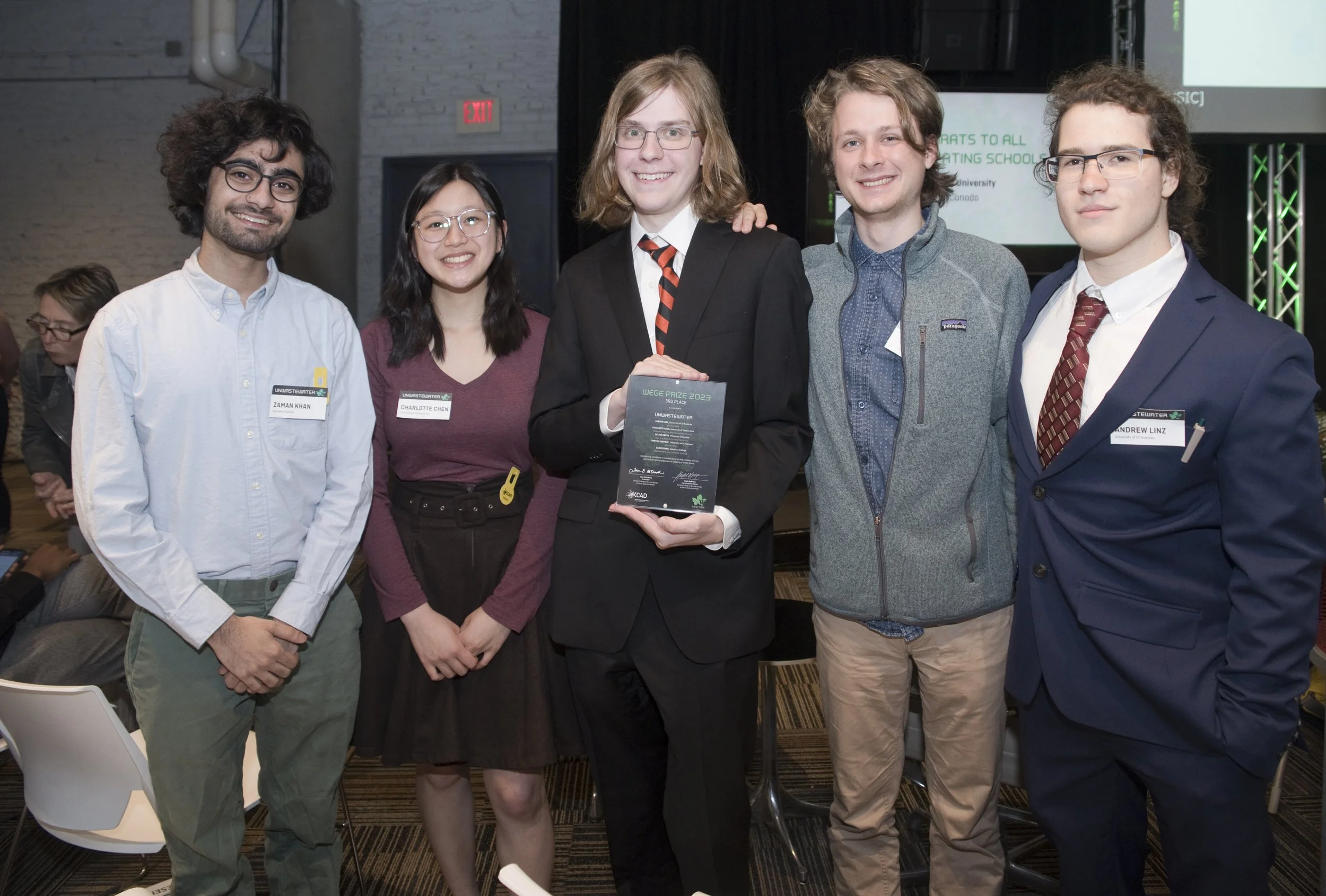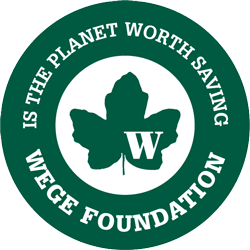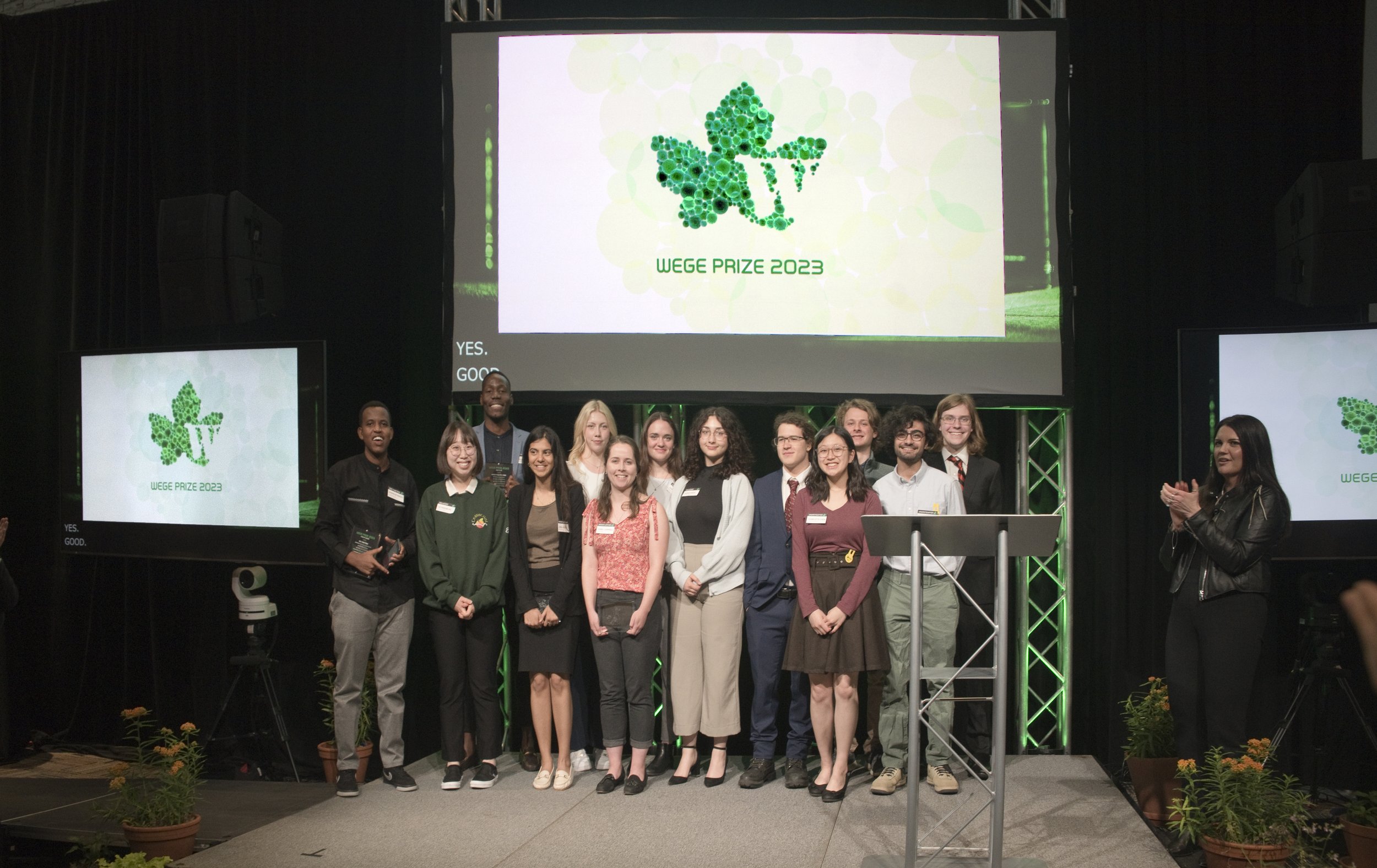2023 Wege Prize winners announced: First-place U.S. team awarded $30,000 for alternative, sustainable leather material from banana plants.
Grand Rapids, Michigan, USA, June 5, 2023 —Three stand-out university student teams from around the world have taken winning spots in 2023 Wege Prize for their ground-breaking solutions to further a circular economy through sustainable approaches that mitigate waste and maximize productivity.
Organized by Kendall College of Art and Design of Ferris State University (KCAD), Wege Prize challenges fiveperson student teams worldwide to collaborate in the advancement of sustainable solutions to today’s “wicked problems” in ways that support a circular economy. Each of this year’s five finalist teams is sharing in the competition’s $65,000 USD in prize money for developing solutions that address agricultural waste, environmental pollution, and wastewater.
For the past decade, Wege Prize has identified winning teams in the interdisciplinary competition, with this year’s top three groups hailing from five countries and six academic institutions. The awarded teams faced an initial pool of 50 competing team representing 37 countries as they progressed through a narrowing selection of contenders during the nine-month, multiphase competition.
Wege Prize teams are inspired to reframe traditional production and consumption methods through a multidiscipline, immersive process encompassing diverse fields of study, cultures, and institutions. The teams’ intensive research, testing, networking, and prototyping is supported and refined through direct feedback from the competition’s panel of expert judges.
“The brilliant student teams that compete in Wege Prize give me hope that humanity will solve the serious ecological problems we face by designing equitable business models that regenerate nature and add economic value,” says sustainable business expert and core judge for Wege Prize, Bill Stough.
The winners of Wege Prize 2023 are:
-
3rd Place ($10,000): UnWastewater, a team using microbes to convert wastewater into raw materials for use in industrial and commercial products, closing the circle between the production and disposal of pharmaceutical chemicals.
-
2nd Place ($20,000): Green Poultry Farm addresses environmental impacts of poultry farming, with the Mozambique team’s students using anaerobic digestion to create usable waste streams.
-
1st Place ($30,000): Banana Leather whose team from Yale University’s business and environmental management programs is producing a sustainably made plant-based leather, mainly from banana crop waste.
Two other student teams, Cellucoat and Agri ThinkTank, each received $2,500 awards as finalists.
“Having a framework like the Wege Prize to kind of streamline our idea–the business model, the feasibility, the down-streaming impact, the social impact–has just been a way that we’ve had to develop this and forced us to think things that have been really helpful and instrumental in propelling this business forward,” says Jinali Mody, lead of the Banana Leather team, first-place winner of 2023 Wege Prize Award.
Wege Prize participants come from diverse academic programs at leading universities worldwide, including students from U.S. Ivy League schools to national science and technology universities in India, Africa, the United Kingdom, Canada, and other countries. The teams’ solutions are making a real-world impact. The 2019 finalist Rutopia’s eco-sensitive tourism concepts, covered by top editors at Forbes, gained funding and support. Others, like 2020 Wege Prize winner Hya Bioplastics and the 2021 team The Chilensis, have advanced to prestigious business incubators that lay the groundwork to implement their prize-winning ideas.
“Each participating Wege Prize team’s innovative ideas for new ways to develop products, services, and business models help drive a regenerative, circular economy,” says Gayle DeBruyn, KCAD professor and Wege Prize organizer. “We are proud of this year’s winners and grateful for all of our student teams and dedicated judges in their pursuit and support of real-world solutions to pressing global issues.”
Wege Prize is made possible through the continuing financial support of The Wege Foundation and KCAD, opening these unique opportunities for undergraduate, graduate, and post-graduate students around the world — and helping take strides toward a greater circular economy.
MORE ABOUT THE WINNING TEAMS

Jinali Mody presenting for team Banana Leather in Grand Rapids, MI at the 2023 Wege Prize Awards
1ST PLACE ($30,000) –
BANANA LEATHER
Institution represented: Yale University
Disciplines represented: Business and the Environment, Industrial Ecology and Green Chemistry, Energy and Business, Energy Access, Business Administration
Producing plant leather from banana crop waste to create Ban-o-fi (for banana-fiber leather), this team’s material is comparable to animal hide in performance, but on a development pathway to being 100% biobased and biodegradable. Paired with a take-back program, their product expands the potential applications for the material and sets a new precedent for leather alternatives. While many current vegan leathers are plastics with potential environmental impacts, Banofi is vegan, cruelty-free, sustainable, and circular, “disrupting the highly polluting textile industry,” says the team. The material’s production upcycles crop waste, uses 90% less water and has 95% lower carbon emissions than animal leather.
“Our solution looks to create plant-based leather from crop waste — mainly the banana stem, which is left on fields to decay. The impact of this solution will be significant carbon emission savings, the number of livestock and exotic animals saved, the crop waste that is upcycled, waste-water pollution and heavy metal pollution avoided, resource reduction and additional income for farmers.”

Vasco Cossa presenting for team Green Poultry Farm in Grand Rapids, MI at the 2023 Wege Prize Awards
2ND PLACE ($20,000) –
GREEN POULTRY FARM
Institution Represented: Eduardo Mondlane University (Mozambique, Africa)
Disciplines Represented: Physics, Environmental Chemistry, Agronomic Engineering, Electronic Engineering
Taking on the wicked problem of environmental pollution associated with poultry farming in Mozambique, this team’s innovative system concept converts poultry waste into biogas and biofertilizers to meet energy needs within poultry production — and to grow feed to supplement farm animals’ diets.
The system’s biodigester system’s innovative use of anaerobic digestion converts poultry waste into biogas and biofertilizers. The biogas is converted into electricity and heat to meet energy needs within poultry production, and the biofertilizer is used to grow feed for the poultry. This promotes the maximum use of resources and contributes to the circular economy by keeping major pollutants in the loop.
“We identified anaerobic digestion as the approach that can address these wicked problems through waste recycling,” says the team. “It can aid in addressing both planetary boundaries and sustainable development goals.”

Team UnWastewater from left to right: Zaman Khan, Charlotte Chen, Kelvin Green, Timothy Redpath, Andrew Linz
3RD PLACE ($10,000) –
UNWASTEWATER
Institutions Represented: Princeton University, Hamilton College University of St. Andrews (Scotland, United Kingdom), University of Connecticut
Disciplines Represented: Engineering, Computer Science, Biochemistry, Engineering, Biology
With the cycle of nature as its model, the team is looking to the premise of a circular economy to create a world without waste by designing closed loop systems to maximize efficiency, prevent pollution and achieve sustainability. To realize this ambitious vision, UnWastewater aspires to revolutionize the treatment of domestic wastewater by utilizing microbial electrosynthesis (MES).
This novel method of biochemical carbon capture and utilization is used to convert domestic wastewater into organic chemical feedstocks, and ultimately, protect the environment, human health and regenerate nature.
“The very term ‘wastewater’ belies the implicit assumption that this byproduct is valueless rather than a legitimate resource,” says the team. “We aim to demonstrate that this assumption is false; that even a substance as undesirable as wastewater has the potential to be an important industrial feedstock.”
About Wege Prize
Wege Prize, a West Michigan-born concept developed by Kendall College of Art and Design of Ferris State University’s (KCAD’s) Wege Center for Sustainable Design with the support of The Wege Foundation, is an annual competition that ignites game changing solutions for the future by inspiring college students around the world to collaborate across institutional, disciplinary, and cultural boundaries and redesign the way economies work.
About KCAD
Located in the heart of downtown Grand Rapids, Michigan, Kendall College of Art and Design of Ferris State University (KCAD) is committed to creating lasting impact in West Michigan and beyond through collaborative partnerships, cultural innovation, and an educational model that prepares students for leadership in design, the visual arts, and art history; provides innovative, collaborative education that fosters intellectual growth and individual creativity; and promotes the ethical and civic responsibilities of artists and designers, locally and globally. For more information, please visit kcad.edu.
About The Wege Foundation
Planting seeds that develop leaders in economicology, health, education, and arts, and enhance the lives of people in West Michigan and around the world. For more information, please visit wegefoundation.com.
Follow Wege Prize on KCAD’s Wege Center for Sustainable Design page on LinkedIn, Facebook (@wegeprize), Twitter (@wegeprize), Instagram (@wegeprize), for more content, updates on participants, and more.

